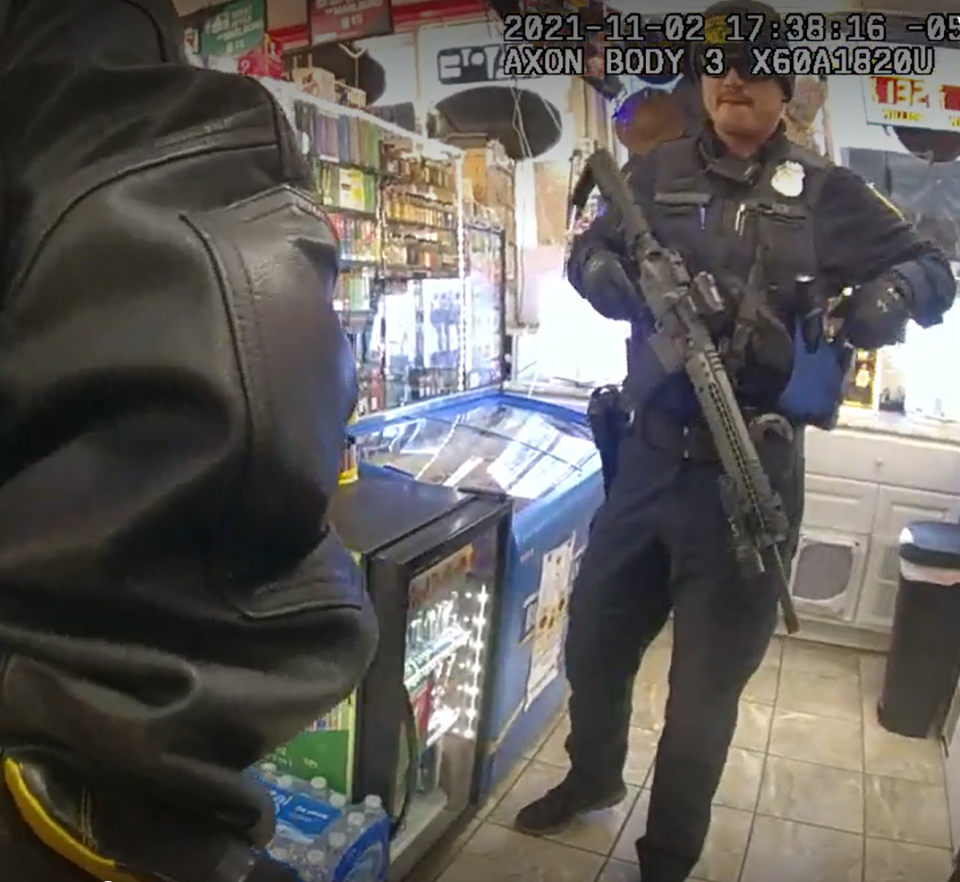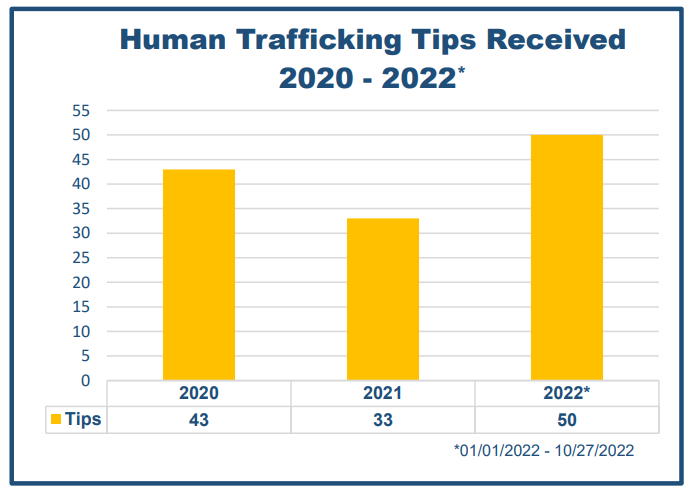How new Iowa laws will make human trafficking, child sexual exploitation charges stronger
Altoona police pull up to a BP in an unmarked truck and quickly get out. The gas station doors chime as officer Blaine Shutts flings them open.
"Dennis, get your hands up!," an officer shouts on body camera footage shared with the Des Moines Register.
Another officer holding a rifle instructs Dennis Kimball, 57, to put down his phone while Shutts pulls Kimball's hands behind his back.
On his cellphone, Kimball was allegedly arranging to have sex with who he thought was an underage girl. Instead, it was Altoona officer David Lowe, whom Kimball also allegedly asked for sexually explicit images — though Lowe had already disclosed his profile belonged to a minor.
"When the handcuffs go on these guys, that is the reward," Lowe said. "It's just the best feeling ever, because you know this guy is going to be charged for this."

The arrest is part of the Altoona Police Department's 18-month-old task force that targets suspected child predators. Their efforts were given a boost when the Iowa Legislature passed a law last session that makes it easier to arrest people who allegedly have sexually exploited children and charge them with harsher penalties. The state also made similar amendments to its human trafficking laws.
Now, defendants are guaranteed prison time if they're convicted of these crimes. Before, it was easy for offenders to slip through the cracks — and potentially reoffend — if they pleaded guilty.
"As a prosecutor, I could convict someone of human trafficking, but the judge could give them — under law — a deferred sentence, which means it can go off their record, or suspended sentence, which means they never serve one day but got probation," said Iowa Attorney General Brenna Bird.
The changes went into effect July 1.
Bird's office has made it a priority to target suspected human traffickers by working to train law enforcement and prosecutors as well as work with groups who help support trafficking victims.
"I think human traffickers are vile, evil, manipulative people who exploit people and cause them so much hurt and pain," she said.
Forty cases have been adjudicated in Iowa since 2005, according to a database on the attorney general's website. A 2021 Federal Human Trafficking Report listed Iowa as fifth in the country for prosecuting new cases of human trafficking, fourth for minor sex trafficking cases and third for forced labor.
For its part, the change in law has emboldened Altoona to train other police departments across the metro to conduct similar investigations. Police said they see the harsher penalties as a better return on investment for their efforts.
More prison time for human trafficking, sexual exploitation in Iowa
The Legislature bumped up all human trafficking offenses two federal letters. A person who knowingly engages in human trafficking can now be convicted of a class B felony, which carries a 50-year sentence with a mandatory minimum of 35 years in prison. If the crime involves a minor, it's bumped up to a class A felony, which comes with life in prison.
Offenders charged with sexually exploiting a minor were previously charged with aggravated misdemeanors. They now face felony charges, the severity of which depends on the crime: People who allegedly have enticed a minor to engage in a sex act are charged with a class B felony, while possession of child pornography is a class D felony, which carries five years in prison. The law changes also eliminated the ability for offenders to get a deferred judgment or suspended sentence if they plead guilty.
Another change means someone can be charged for enticing or exploiting a minor even if they're actually talking to an officer or an agent posing as a minor. This includes sending obscene material through the phone.
"Just the amount of firepower of what this law is going to change is just absolutely insane," Lowe said.
Sending explicit photos, trying to meet up or requesting images all are on the table for arrest.
"If we can identify who this is, even if they don't show up or if they ghost us, if they've been engaging with us we can still go after them," said Lt. Steve Harris with the Altoona Police Department.
The sting involving Kimball occurred in November of 2021. Police then relied on an Iowa law called solicitation of commercial sexual activity, a felony that carries just five years in prison and 10 years on the sex offender registry, according to Meggan Guns, assistant Polk County Attorney. It was the only statute that allowed law enforcement to arrest an offender who was talking to an actual minor or law enforcement posing as one.
In this case, Altoona used the law to pose as a minor, and then handed the case over to the FBI so Kimball could be federally charged and receive a harsher punishment.
Kimball was eventually federally charged with:
Attempted sexual exploitation of a minor.
Enticement and attempted enticement of a minor to engage in illicit sexual activities.
Transfer and attempted transfer of obscene material to a minor.
Use and attempted use of interstate facilities to transmit information about a minor.
Commission of a felony offense involving a minor by a registered sex offender.
According to court documents, Kimball pleaded guilty to enticement and attempted enticement of a minor to engage in illicit sexual activities and was sentenced to 20 years in prison, five years of supervised release and a $100 fine.
Altoona police target suspected predators with text conversations
At any given moment, Lowe has dozens of unread notifications from people seeking sex online.
Lowe said after disclosing he's a minor, 90% apologize and cut off communication. The other 10% continue the conversation and eventually make plans to meet in person.
"It's been incredibly eye-opening on a lot of different levels," Lowe said. "I just got inundated with people who were wanting to chat with me. Just so much, I couldn't keep up with it. Like physically can't keep up with the amount of people that were talking, really."
In 2020, Altoona police became affiliated with the Internet Crimes Against Children — a national task force program that works with local, state and federal law enforcement — when they took on a lot of child pornography cases and cyber tips. Most of what police do is reactive, but the force wanted to change its child exploitation response to be more proactive. Lowe also assists other agencies in human trafficking efforts.
"This isn't that hard; you just gotta make it a priority," Harris said. "And even though you've always got a caseload, this is something we work in the background ... as more people see how rewarding this is, I think more people are gonna do it. "
According to Lowe, 99% of those who reached out to talk were men. Age, race and ethnicity vary. Many are or have been married and have children.
Lowe said sometimes the conversations start off slow, and other times, they are aggressive out of the gate, asking for photos and whether the child knows various things about sex.
"Ultimately, it's like chess. You have to play the long game. You play the strategy," Lowe said. "I know at the end of the day, whatever he gets coming to him, he gets coming to him."
"This is all for the greater good of society. If this person is talking to me in this fashion, then who else is he talking to? Or who has he talked to in the past?," he said.
Human trafficking can be found anywhere, officials say
Human trafficking is defined by the Office to Combat Human Trafficking as a crime involving the exploitation of a victim for commercial sex through force, fraud or coercion or for compelled labor. Officials say the crime is everywhere, and Altoona police said they've encountered traffickers who were fathers, neighbors, spouses and even doctors.
The Bureau of Justice Assistance released demographics on who has been prosecuted for human trafficking across the country. In 2022, it found:
92% were male.
63% were white.
95% were U.S. citizens.
66% had no prior convictions.
"So many people believe (human trafficking) is the movie 'Taken,'" said Guns, referring to a film in which actor Liam Neeson is a former spy who tries to save his kidnapped daughter. "That's not human trafficking. It's almost always somebody that the victim knows already, and it's usually somebody that they've had a relationship with before they started being trafficked."
In 2022, the Iowa Office to Combat Human Trafficking documented 50 human trafficking tips and leads, with 32 of them involving sex. The report didn't provide the number of cases prosecuted, but said the Southern District of Iowa opened three cases in 2022. It also reported "several recent court-related convictions."

A 2021 Federal Human Trafficking Report said five people were convicted of sex trafficking in the state, all in the Southern District of Iowa. According to the data provided, 67% of victims were minors and all were female.
Oftentimes, a power dynamic between the attacker and the victim prevents the victim from running away. Victims typically are groomed with false promises of a better life or a strong relationship but then are beaten, raped and trafficked to reinforce who is in charge, according to Charlotte Kovacs, victim witness specialist at the U.S. Department of Justice.
"The public may think 'Well, she drove herself to that hotel, clearly she could've left. She could've went to the police right then and there and she didn't,'" Kovacs said. "But this is a psychological crime ... the victim at this point will do absolutely anything to keep the trafficker happy, because there'll be less beatings that way and less sex work to do."
How to get help with combating human trafficking in Iowa
The National Human Trafficking Resources hotline offers 24/7 confidential assistance for those being trafficked or want to report that someone may be. The hotline has a directory to find local emergency, transitional and long-term services for victims and survivors of human trafficking.
Hotline: 1-888-373-7888
Text: 233733
Website: humantraffickinghotline.org
For services in Iowa, contact the Iowa Helpline at 1-800-770-1650 or text "IOWAHELP" to 20121, and visit the Iowa Office to Combat Human Trafficking.
The Iowa Businesses Against Trafficking initiative encourages its members to learn about human trafficking in order to combat it. To learn how to recognize signs of human trafficking and ways to prevent it, or to join Iowa Businesses Against Trafficking, visit ibat.iowa.gov.
Noelle Alviz-Gransee is a breaking news reporter at the Des Moines Register. Follow her on Twitter@NoelleHannika or email her at NAlvizGransee@registermedia.com.
This article originally appeared on Des Moines Register: New Iowa laws bolster child exploitation, human trafficking penalties

